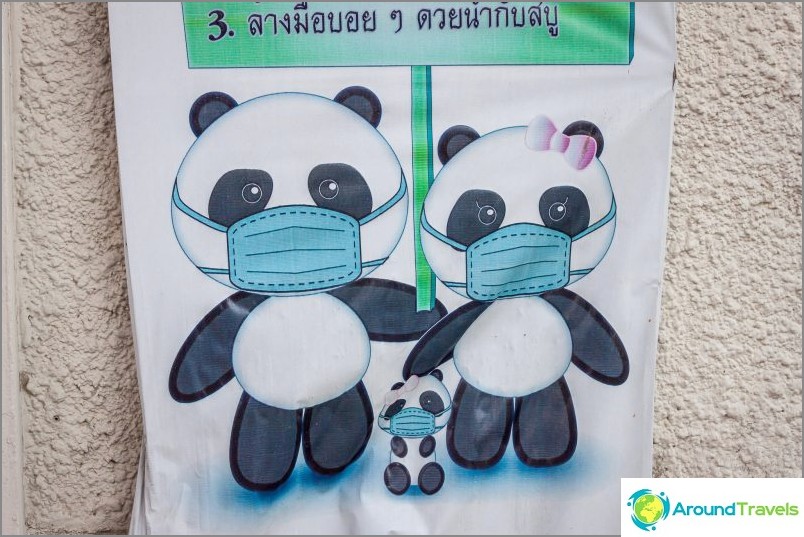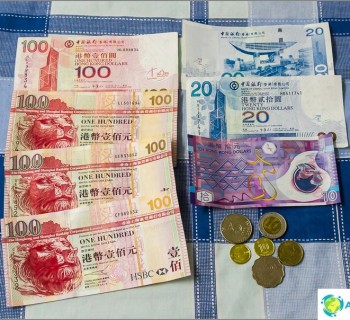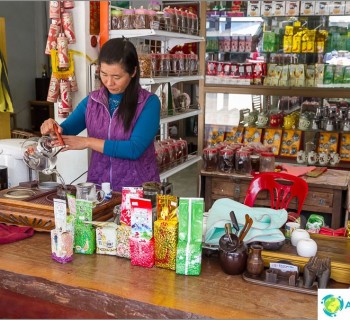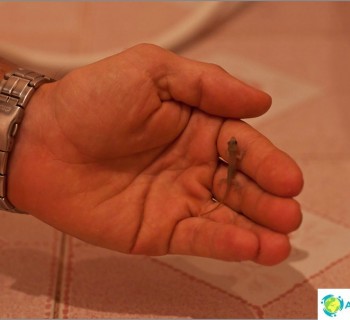Have you read the news and thought about whether you need vaccinations in Thailand? Earlier I also had such a question, but now my many years of wintering experience tells you what? None, except for those that should be put on the schedule of vaccinations. But before sitting down to an article and expressing my own opinion on this matter, I once again looked through the answer options in competent sources, starting with the websites of Rospotrebnadzor, the Ministry of Health and the Ministry of Tourism, ending with private blogs and large communities in social networks. As a result, my opinion has not changed, and the answer to the question «do i need vaccinations before traveling to Thailand» will be the same - not needed. And that's why.
The content of the article
Major diseases of Thailand
Do not forget that I am not a physician, so I cannot articulate all medical nuances correctly. My opinion is not based on global statistics and background information, but on my personal experience of traveling in Thailand, the experience of multiple wintering with my family and constant communication with other winterers and expats. I will not rewrite for you (even in a concise form) all the symptoms and methods of infection - there are specialized resources for this, and you will find them yourself if you decide to dive into the topic in a little more detail. The list of diseases will be enough, won't you? so.
What do the doctors of the Russian Federation scare?
According to the main medical sites of the Russian Federation, the main diseases in Thailand are:
- Intestinal diseases. There are no vaccinations, but there are a number of measures and procedures to prevent infection.
- Hepatitis A and B. From them, we are already, as a rule, vaccinated.
- Tetanus. Already vaccinated, but the vaccine is given once every 10 years, and if you do not remember the date of the injection, then you will be given it after injury (deep cuts and punctures with contamination of the wound with foreign bodies).
- Yellow fever. There is a vaccine, but the threat of yellow fever in Thailand is rather potential. That is - everyone knows, but no one is sick.
- Malaria. No vaccine.
- Dengue fever. There is a vaccine, but there are a lot of nuances, and there is no sense from it for those who arrived for less than a year.
- Zika fever. The vaccine has been found, it is undergoing preclinical trials and is expected to be widely available from 2019.
- Parasitic infections. Vaccinations are not given, you need to take care of yourself on your own.
- Rabies. Injections are given upon the fact of an animal attack.
Than the doctors in Thailand scare
Unlike our doctors, Thai doctors know more precisely the specifics of their region and constantly recommend vaccinations against hepatitis and Japanese encephalitis. Although I have more than once met with people the opinion that Thai doctors are ready to inject you at least all vaccinations on the list from A to Z, if you agree to them, medicine is paid. But the most honest doctors recommend these two, although Japanese encephalitis is an extremely rare thing and is typical only for a number of provinces. It should be noted that the quality of vaccines in Thailand is better than Russian ones, and the price does not differ much from, for example, Moscow.
The vaccination schedule in Thailand is almost one-on-one with the vaccination schedule at home, so there is no need to worry that you are leaving for the winter with a baby who is scheduled to be vaccinated. In Russia, parents are now trying to avoid free vaccinations whenever possible, preferring imported vaccines to domestic vaccines, so it makes no difference where you pay for it. The price ranges between 500 and 1500 baht. In larger clinics and with a big name like Bangkok Hospital, prices will be raised one and a half or two times, well, do not forget that bills for doctor and hospital services will be added to this cost.

Vaccinations in Thailand and diseases
What are they really sick with
And now get and sign for the real top of diseases and sores that can disable you during the winter or on vacation. I list them in descending order, that is, at the top of the list - the most popular.
- Sunburn. The main problem for inexperienced people. We save ourselves with creams, shadows, long clothes.
- Food poisoning. Do not drink raw water, do not take drinks with ice from creepy places, constantly wash your hands, well, and other rules of ordinary hygiene.
- Colds. Ice drinks, air conditioners in the store, in the car and at home do their dirty work. Runny nose and sore throat are common even for Thais..
- Fall from a scooter or accident. There is no vaccine. Wear long, tight clothing and a helmet, buckle up in the car, watch your eyes and be careful. Feel insecure - take taxis and transfers.
- Allergic rashes and skin problems. It is treated according to the doctor's prescription (please note that in many insurances skin diseases are not insured events).
- Hands-feet-mouth (Coxsackie Virus). No vaccination.
And then only dengue fever, insect bites, hepatitis, jellyfish and sea urchins come, and Japanese encephalitis and malaria in general are at the end of the list of possible dangers for farang. I want to note that I am not saying that diseases from the list of Russian doctors will not affect you, that would be too arrogant. There are always chances, but only Buddha knows which ones. And according to our everyday experience, we would not bother looking for exotic vaccinations against exotic diseases. Except for one recommendation - measles vaccination. You need to know for sure whether they put it to you or the Internet, and when they did it. I remember a case when the media exaggerated the topic of how in Izhevsk a couple of dozen people in an infectious disease were under quarantine because of one tourist who brought measles from Thailand.
How to be saved?
The most logical recommendation for a trip to Thailand is good insurance. It relieves you of the headache of paying for very expensive medical services if necessary, and the top of these cases from my «life list» just the same is covered by insurance, plus there are different Coxsacks and Dengue, you can also treat without unnecessary financial losses. My opinion is that if you are not going to Thailand for years, do not plan to wander in the jungle and hang out in disadvantaged areas, then you have nothing to get used to. And before wintering, be sure to visit a dentist, so as not to look for the most handmade Thai doctor, according to compatriots' reviews..
Insurance rating for Thailand>
For the rest, do not forget about simple hygiene rules. For example, carrying wet wipes or a bottle of alcohol from the pharmacy with you is a good thing, especially for parents of toddlers. Make sure that the child does not sit on the open sand for a long time (do not abuse it yourself), does not pull something lifted from the ground into his mouth and does not eat sand on the beach. Drink only bottled water, teeth can also be brushed and rinsed only with bottled water, but I ignore this rule. For housing, choose a resort with a normal administration that spends money on etching mosquitoes inland. Well, and take all measures to scare away mosquitoes - these bastards carry, and Dengue, and Zika, and malaria.
And to consolidate the material, I will repeat: the media are very fond of fried, especially if this is not happening in our country. Therefore, any hysteria about an epidemic or flood must be divided by sixteen. Yes, the climate in Thailand is different from ours and there are diseases that seem creepy to us, but the key word «seem to». Always double-check the information from the media, otherwise it will turn out like in that conversation that I spied on the Internet. There, one man to another in all seriousness argued that in Thailand, some spores float in the sea, which get into the male member and sprout there with grass. And that only Thai medicine can fight this, and the course of treatment is at least two weeks. You will get sick once and then you will be constantly treated.
P.S. Another horror story about dangerous insects and animals - my opinion is here.
P.P.S. UPD on the comments of readers - vaccination against Rotavirus.
I read about this vaccine, and that's what became clear. Rotavirus, according to WHO recommendations, should be vaccinated in countries with an increased risk of morbidity, which includes the Southeast Asian region. There are only two vaccines: RV5 RotaTeq ™ and RV1 Rotarix ™. RotaTeq ™ is based on human strain and Rotarix ™ is based on human and bovine strains. RotaTek is used in the Russian Federation. The first dose of the vaccine should be given to a child under 6 weeks of age. The RV1 vaccine is given twice, the RV5 three times, orally, with an interval of at least four weeks. Moreover, RotaTek can be vaccinated on the same day with other vaccinations, except for the oral live polio vaccine. The vaccine lasts for about 2 years. Vaccinations for children over two years old also seem to make sense, but it has been proven that the Rotashield vaccination increases the chances of getting a complication - intestinal obstruction.
That is, in my opinion, it makes sense to vaccinate a child under the age of 2 years, but not later. And even then, provided that the child will constantly be in the epicenter of the children's party - nurseries, gardens or clinics. If he spends most of his time at home, then the vaccine is not needed. And everyday experience shows that rotavirus in Thailand is about as common as other enteroviruses, such as Astrovirus or Norovirus, the main problems of which are dehydration and (possibly) convulsions against a background of high fever. But any parent knows what to do at high temperatures and how to restore the body from dehydration. Therefore, I do not see much sense in vaccinating a child against one of the possible variants of diseases, and even with such a side effect.


